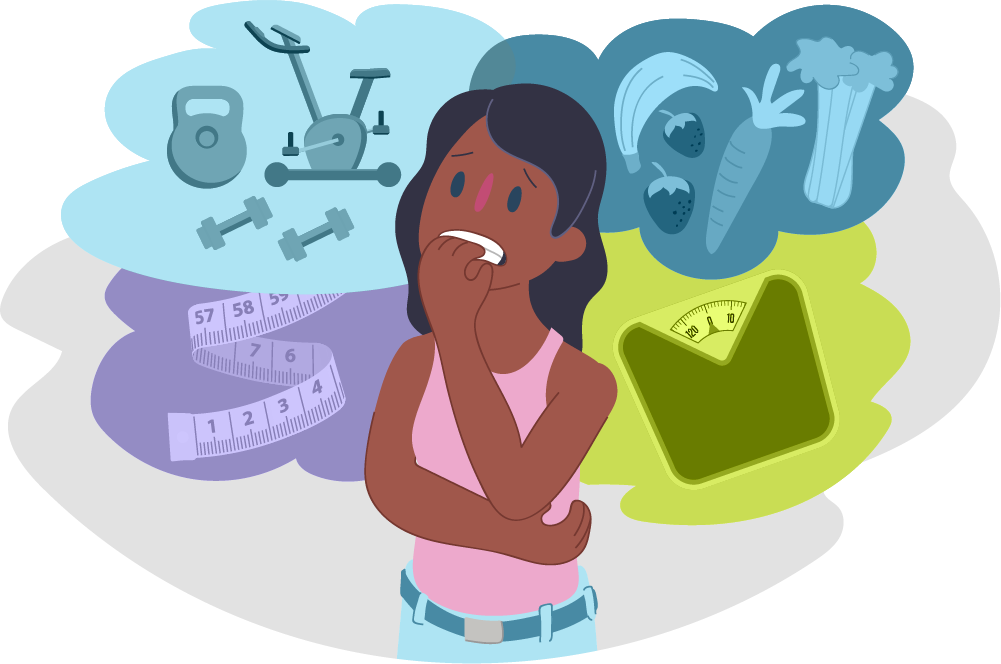Mental Health Awareness Month-Eating Disorders

BY ESTHER MUTURI
Eating disorders are serious health conditions that affect one’s physical and mental health. These conditions may include problems in how one thinks about food, eating, weight and shape, and eating behaviors. These symptoms may affect one’s health, emotions, and ability to function.
Eating disorders may become long-term, bring problems, and worst case possibly cause death. The most common eating disorders are anorexia, bulimia, and binge-eating disorder.
Eating disorders involve focusing too much on weight, body shape, and food and may lead to dangerous eating behaviors. These behaviors can seriously affect the ability to get the nutrition your body needs.
The disorders can harm the heart, digestive system, bones, teeth, and mouth. They can lead to other diseases. They’re also linked with depression, anxiety, self-harm, and suicidal thoughts and behaviors.
Anorexia can be a life-threatening eating disorder that includes unhealthy low body weight, intense fear of gaining weight, and a view of weight and shape that is not realistic. It may also involve methods to lose weight, using diet aids, or vomiting after eating. Efforts to reduce weight may cause severe health problems.
Bulimia is a serious, sometimes life-threatening eating disorder. This may involve being preoccupied with weight and body shape with a severe and harsh self-judgment of personal appearance.
Bulimia includes episodes of bingeing, commonly followed by episodes of either vomiting or exercising too much to get rid of the calories. Some may even get to the point of changing insulin amounts to lose weight.
Binge eating disorder, on the other hand, involves eating too much food in a short period of time, and restrictive food intake disorder involves eating extremely limited eating or not eating certain foods.
Eating disorders may be difficult to deal and overcome with. Treatment from the doctor is advisable.
Red flags that may suggest an eating disorder include:
Skipping meals or snacks or making excuses for not eating, having a very limited diet that hasn’t been prescribed by a trained medical professional, and too much focus on food or healthy eating, especially if it means not participating in usual events, such as eating birthday cakes or dining out, repeatedly eating large amounts of foods, exercising more than the average person and problems with loss of tooth enamel that may be a sign of repeated vomiting.
Anyone can develop an eating disorder. Eating disorders often start in the teen and young adult years. But they can occur at any age. Certain factors may increase the risk of developing an eating disorder, including:
Family history. Eating disorders are more likely to occur in people who have parents or siblings who’ve had an eating disorder.
Other mental health issues. Trauma, anxiety, depression, obsessive-compulsive disorder, and other mental health issues can increase the likelihood of an eating disorder.
Dieting and starvation. Frequent dieting is a risk factor for an eating disorder, especially with a weight that is constantly going up and down when getting on and off new diets.
A history of weight bullying. People who have been teased or bullied for their weight are more likely to develop problems with eating and eating disorders. This includes people who have been made to feel ashamed of their weight by peers, healthcare professionals, coaches, teachers, or family members.
Stress. Whether it’s heading off to college, moving, landing a new job, or a family or relationship issue, change can bring stress. And stress may increase the risk of an eating disorder.
Eating disorders cause a wide variety of complications, some of them life-threatening. The more severe or long-lasting the eating disorder, the more likely it is that serious complications may occur. These may include:
Serious health problems, depression and anxiety, suicidal thoughts or behavior, problems with growth and development, social and relationship problems, substance use disorders, work and school issues, and eventually death.
Prevention for Eating Disorders may include: Choosing a healthy diet rich in whole grains, fruits, and vegetables and avoiding extreme dieting.
Don’t use dietary supplements, laxatives, or herbal products for weight loss.
Get enough physical activity. Each week, get at least 150 minutes of aerobic activity, such as brisk walking.
Seek help for mental health issues, such as depression, anxiety, or issues with self-esteem and body image.
Tags: Who Signstv Mental Health Awareness Eating Disorders
Related
Share this article
Experienced and versatile writer, dedicated to using my exceptional writing and editing skills to inform and advocate. My work focuses on educating and entertaining readers on a range of topics, with a particular expertise in matters of disability.
View articles

